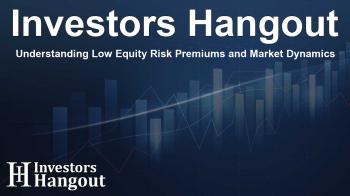Understanding Low Equity Risk Premiums and Market Dynamics

Understanding the Low Equity Risk Premium
The equity risk premium (ERP) is a crucial financial metric that expresses the additional return investors seek for holding riskier equities compared to safer assets. In recent times, the ERP is observed at remarkably low levels, raising concerns among institutional investors and market analysts.
What's Driving the Low Equity Risk Premium?
As of a recent evaluation, expert analysis indicates that the implied ERP for major stock indices has diminished significantly. This points to a scenario in which investors are willing to accept lower potential returns for taking on increased risks. This situation should definitely not be ignored, as it may lead to misleading valuations and unwise investment strategies.
The Risks of Mispricing
When the ERP is low, it can lead to mispriced risks. This mispricing potentially sways retail investors to make rash decisions while institutions managing substantial assets may also misjudge their strategies due to market pressures. Understanding that the ERP can vary significantly across different markets and sectors is essential for making informed investment choices.
Why Does It Matter?
The current low levels of ERP result in reduced compensation for risk taking. Consequently, traditional valuation methodologies, such as discounted cash flow models, may face limitations, creating challenges for both institutional and retail investors. Recognizing this risk landscape is vital for maintaining investment integrity.
A Deeper Look at Market Predictions
Market analysts have expressed that the equity risk premium is currently accommodating expectations of a stabilized economic environment. Investors today must be cautious, as this perspective can translate into prices expecting flawless market conditions. Any deviation from these expectations might result in volatile market reactions.
Future Implications of Fed Policy
The potential for falling interest rates is another worry. Current market sentiment forecasts possible rate cuts from central banks, which could further decrease the ERP. However, lower ERPs might not necessarily stimulate market rallies. If economic growth falters or if inflation spikes, this situation might lead to sharp valuation declines.
The Importance of Risk Assessment
As investors navigate the current equity landscape, it is imperative to reassess how much risk they are genuinely being rewarded for. The diminished equity risk premium underscores the need for a more rigorous analysis of investment strategies, emphasizing the importance of adapting to shifting market conditions.
Strategies for Investors
For overall investment success, diverse strategies may be employed. Investors can focus on thorough research, maintaining liquidity, and being cautious of relying solely on historical averages to guide their decisions. Additionally, a well-rounded understanding of market dynamics will allow for better risk management, ensuring investors are not caught off guard by unexpected market movements.
Frequently Asked Questions
What is the Equity Risk Premium?
The equity risk premium is the additional return investors expect to earn from holding equities over risk-free investments, such as government bonds.
Why is the current ERP considered low?
A low ERP indicates investors are receiving less compensation for taking on additional risk. This trend suggests that current stock prices may be overvalued.
What are the implications of a low ERP for investors?
Investors may face increased volatility and the potential for significant losses if market conditions shift unexpectedly, making risk management crucial.
How does the Federal Reserve's policy affect ERP?
The Federal Reserve's interest rate decisions can heavily influence the ERP, impacting investor expectations and market dynamics.
Should investors change their strategies in light of a low ERP?
Yes, investors should reassess their strategies, enhance their risk evaluation processes, and be cautious with their investments in a low ERP environment.
About The Author
Contact Hannah Lewis privately here. Or send an email with ATTN: Hannah Lewis as the subject to contact@investorshangout.com.
About Investors Hangout
Investors Hangout is a leading online stock forum for financial discussion and learning, offering a wide range of free tools and resources. It draws in traders of all levels, who exchange market knowledge, investigate trading tactics, and keep an eye on industry developments in real time. Featuring financial articles, stock message boards, quotes, charts, company profiles, and live news updates. Through cooperative learning and a wealth of informational resources, it helps users from novices creating their first portfolios to experts honing their techniques. Join Investors Hangout today: https://investorshangout.com/
The content of this article is based on factual, publicly available information and does not represent legal, financial, or investment advice. Investors Hangout does not offer financial advice, and the author is not a licensed financial advisor. Consult a qualified advisor before making any financial or investment decisions based on this article. This article should not be considered advice to purchase, sell, or hold any securities or other investments. If any of the material provided here is inaccurate, please contact us for corrections.

